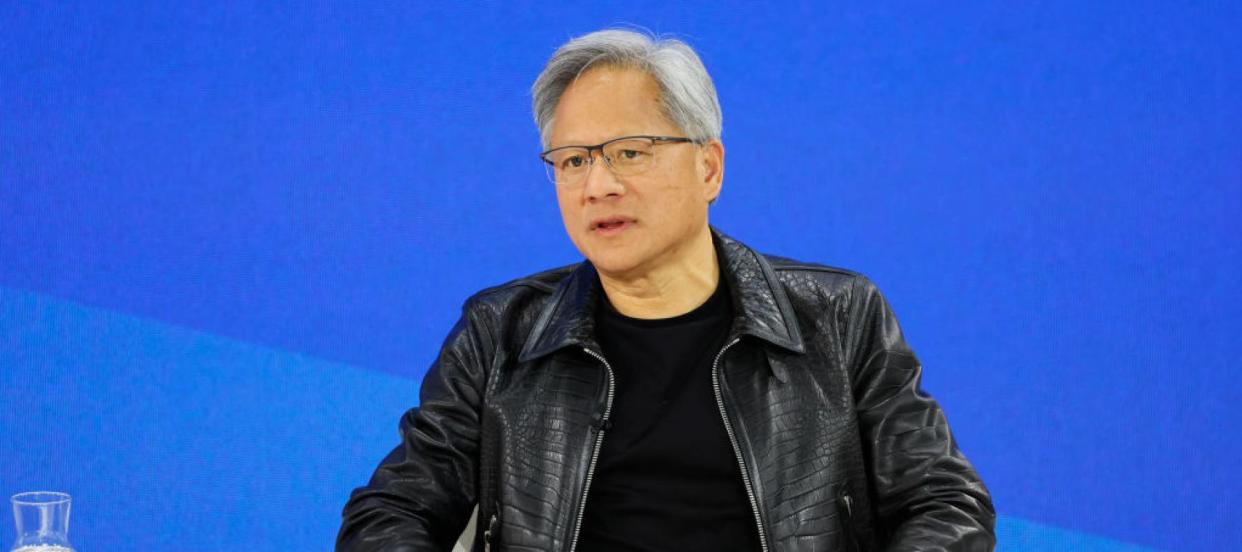Jensen Huang lost nearly $20B in net worth since Nvidia shares peaked — how to diversify your own portfolio

The story of Nvidia (NVDA) founder and CEO Jensen Huang is a compelling testament to the American Dream.
Huang's journey began humbly, working as a dishwasher at Denny's, where he often had to clean toilets.
Today, his company boasts a market capitalization of $2.76 trillion, and, as of this writing, he ranks as the 14th richest person in the world with a net worth of $99.3 billion, according to the Bloomberg Billionaires Index.
Don't miss
Commercial real estate has beaten the stock market for 25 years — but only the super rich could buy in. Here's how even ordinary investors can become the landlord of Walmart, Whole Foods or Kroger
Car insurance premiums in America are through the roof — and only getting worse. But 5 minutes could have you paying as little as $29/month
These 5 magic money moves will boost you up America's net worth ladder in 2024 — and you can complete each step within minutes. Here's how
Nvidia initially gained recognition for its cutting-edge graphics processing units (GPUs), which revolutionized the gaming and computer graphics industries. However, it was the company's involvement with artificial intelligence (AI) that truly catapulted it into the spotlight.
The debut of ChatGPT in late 2022 marked a pivotal moment in AI, capturing the world's attention. Nvidia, a key player in powering AI advancements, quickly became a market darling as investors flocked to AI-driven opportunities.
In 2023, Nvidia shares skyrocketed by 239%, and the momentum has continued into 2024, with the stock up another 133% year-to-date. This meteoric rise reflects the market's insatiable appetite for AI technology and Nvidia's pivotal role in its development.
However, the stock's trajectory has not been without fluctuations. Nvidia reached an all-time high of $135.58 on June 18 but has since retraced some of its gains.
Fluctuating billions
Huang’s wealth is largely tied to his holdings in Nvidia shares. According to a March 2024 filing cited by Bloomberg, Huang owns more than 3.5% of the company.
As Nvidia's share price fluctuates, so does Huang's fortune. At the end of 2022, Huang’s net worth stood at $13.8 billion. By the close of 2023, his wealth had surged to $44.0 billion, marking a staggering 219% increase within a year.
As the upward trajectory of Nvidia shares continued into 2024, Huang’s fortune received a further boost. On June 18, his net worth reached an all-time high of $119 billion, coinciding with Nvidia shares hitting their peak.
However, since that peak, Huang’s net worth has declined as Nvidia shares have fallen. The latest data shows Huang’s net worth at $99.3 billion as of July 29, reflecting a loss of approximately $19.7 billion in just over a month.
Read more: Car insurance rates have spiked in the US to a stunning $2,150/year — but you can be smarter than that. Here's how you can save yourself as much as $820 annually in minutes (it's 100% free)
Diversifying strategies
For tech magnates like Huang, their wealth is often intrinsically linked to the companies they helped create. For the average investor, however, diversifying their portfolio can help mitigate risks and protect their assets from the wild swings of a single stock.
As investing legend Warren Buffett once said, “I do not think the average person can pick stocks.”
One of the easiest ways to diversify in the U.S. stock market is through index funds. Buffett has long advocated for low-cost index funds, particularly those tracking the benchmark S&P 500 Index.
He has even revealed that after he dies, 90% of his wife’s inheritance will go into “a very low-cost S&P 500 index fund.”
By investing in an S&P 500 index fund, an investor gains exposure to a broad range of large-cap U.S. companies, providing diversified holdings across various sectors of the economy. This means that if one stock tumbles, the impact on the overall portfolio will be limited.
There are quite a few options available, including exchange traded funds such as the Vanguard S&P 500 ETF (VOO) and the SPDR S&P 500 ETF Trust (SPY). Investors can also consider sector-specific ETFs for targeted exposure to particular sectors.
Additionally, it's important to remember that diversification isn't limited to stocks.
You can also spread investments across other asset classes like bonds, real estate, and commodities.
Given that each individual has unique investment goals and risk tolerance, it might be beneficial to consult with a financial professional to help tailor your investment approach to your specific circumstances and goals.
What to read next
Cost-of-living in America is still out of control — use these 3 'real assets' to protect your wealth today, no matter what the US Fed does or says
Jeff Bezos and Oprah Winfrey invest in this asset to keep their wealth safe — you may want to do the same in 2024
Stop crushing your retirement dreams with wealth-killing costs and headaches — here are 10 'must-haves' when choosing a trading platform (and 1 option that has them all)
This article provides information only and should not be construed as advice. It is provided without warranty of any kind.
